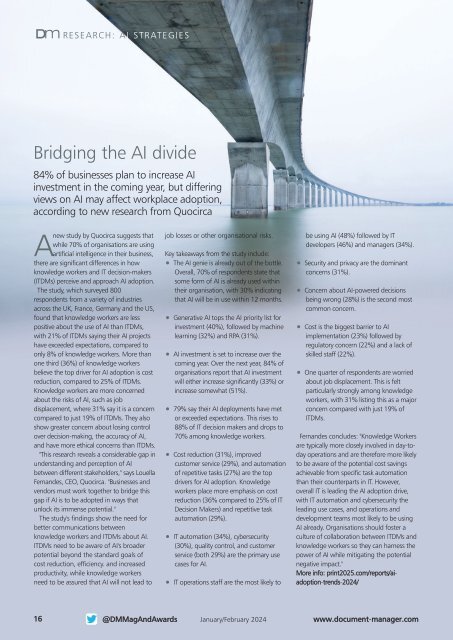DM Jan-Feb 2024
You also want an ePaper? Increase the reach of your titles
YUMPU automatically turns print PDFs into web optimized ePapers that Google loves.
Dm RESEARCH: AI STRATEGIES<br />
Bridging the AI divide<br />
84% of businesses plan to increase AI<br />
investment in the coming year, but differing<br />
views on AI may affect workplace adoption,<br />
according to new research from Quocirca<br />
Anew study by Quocirca suggests that<br />
while 70% of organisations are using<br />
artificial intelligence in their business,<br />
there are significant differences in how<br />
knowledge workers and IT decision-makers<br />
(IT<strong>DM</strong>s) perceive and approach AI adoption.<br />
The study, which surveyed 800<br />
respondents from a variety of industries<br />
across the UK, France, Germany and the US,<br />
found that knowledge workers are less<br />
positive about the use of AI than IT<strong>DM</strong>s,<br />
with 21% of IT<strong>DM</strong>s saying their AI projects<br />
have exceeded expectations, compared to<br />
only 8% of knowledge workers. More than<br />
one third (36%) of knowledge workers<br />
believe the top driver for AI adoption is cost<br />
reduction, compared to 25% of IT<strong>DM</strong>s.<br />
Knowledge workers are more concerned<br />
about the risks of AI, such as job<br />
displacement, where 31% say it is a concern<br />
compared to just 19% of IT<strong>DM</strong>s. They also<br />
show greater concern about losing control<br />
over decision-making, the accuracy of AI,<br />
and have more ethical concerns than IT<strong>DM</strong>s.<br />
"This research reveals a considerable gap in<br />
understanding and perception of AI<br />
between different stakeholders," says Louella<br />
Fernandes, CEO, Quocirca. "Businesses and<br />
vendors must work together to bridge this<br />
gap if AI is to be adopted in ways that<br />
unlock its immense potential."<br />
The study's findings show the need for<br />
better communications between<br />
knowledge workers and IT<strong>DM</strong>s about AI.<br />
IT<strong>DM</strong>s need to be aware of AI's broader<br />
potential beyond the standard goals of<br />
cost reduction, efficiency. and increased<br />
productivity, while knowledge workers<br />
need to be assured that AI will not lead to<br />
job losses or other organisational risks.<br />
Key takeaways from the study include:<br />
The AI genie is already out of the bottle.<br />
Overall, 70% of respondents state that<br />
some form of AI is already used within<br />
their organisation, with 30% indicating<br />
that AI will be in use within 12 months.<br />
Generative AI tops the AI priority list for<br />
investment (40%), followed by machine<br />
learning (32%) and RPA (31%).<br />
AI investment is set to increase over the<br />
coming year. Over the next year, 84% of<br />
organisations report that AI investment<br />
will either increase significantly (33%) or<br />
increase somewhat (51%).<br />
79% say their AI deployments have met<br />
or exceeded expectations. This rises to<br />
88% of IT decision makers and drops to<br />
70% among knowledge workers.<br />
Cost reduction (31%), improved<br />
customer service (29%), and automation<br />
of repetitive tasks (27%) are the top<br />
drivers for AI adoption. Knowledge<br />
workers place more emphasis on cost<br />
reduction (36% compared to 25% of IT<br />
Decision Makers) and repetitive task<br />
automation (29%).<br />
IT automation (34%), cybersecurity<br />
(30%), quality control, and customer<br />
service (both 29%) are the primary use<br />
cases for AI.<br />
IT operations staff are the most likely to<br />
be using AI (48%) followed by IT<br />
developers (46%) and managers (34%).<br />
Security and privacy are the dominant<br />
concerns (31%).<br />
Concern about AI-powered decisions<br />
being wrong (28%) is the second most<br />
common concern.<br />
Cost is the biggest barrier to AI<br />
implementation (23%) followed by<br />
regulatory concern (22%) and a lack of<br />
skilled staff (22%).<br />
One quarter of respondents are worried<br />
about job displacement. This is felt<br />
particularly strongly among knowledge<br />
workers, with 31% listing this as a major<br />
concern compared with just 19% of<br />
IT<strong>DM</strong>s.<br />
Fernandes concludes: "Knowledge Workers<br />
are typically more closely involved in day-today<br />
operations and are therefore more likely<br />
to be aware of the potential cost savings<br />
achievable from specific task automation<br />
than their counterparts in IT. However,<br />
overall IT is leading the AI adoption drive,<br />
with IT automation and cybersecurity the<br />
leading use cases, and operations and<br />
development teams most likely to be using<br />
AI already. Organisations should foster a<br />
culture of collaboration between IT<strong>DM</strong>s and<br />
knowledge workers so they can harness the<br />
power of AI while mitigating the potential<br />
negative impact."<br />
More info: print2025.com/reports/aiadoption-trends-<strong>2024</strong>/<br />
16 @<strong>DM</strong>MagAndAwards <strong>Jan</strong>uary/<strong>Feb</strong>ruary <strong>2024</strong> www.document-manager.com
















